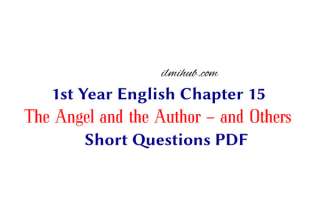In this post, I am sharing A Man of Words and Not of Deeds Poem Explanation of Lines with Reference to the Context. This is the 19th (second last) poem from the intermediate part 1 English Book 3. These notes belong to kips notes. Previously I have shared all poems notes for class 11 students. Students should also see relevant notes at the bottom of the post. Don’t forget to subscribe to our Youtube Channel.
1st Year English Poem 19 A Man of Words and Not of Deeds Explanation with Reference to the Context
Reference
These Lines have been taken from the poem, “A Man of Words and Not of Deeds” by Charles Perrault.
Context
A man who only talks and does nothing lives a meaningless and wasteful life. The poet wants to say that a talkative man is doomed to live a wretched life and die a fearful death.
Explanation of Lines 1 – 2

The poet describes different phases of a person who only talk and boasts and does not act accordingly. The poet describes the gradual adverse change which leads him towards the ultimate devastation. The poet expresses the worst situation with the help of various similes. The poet says that a talkative and impractical person is like a garden where unwanted plants start growing. Garden is meant for production and fruitfulness, while unwanted plants prevent the growth and reduce productivity. Same is the case with a person. He becomes inactive. His abilities begin to rust. He seeks comfort in boasting and talking.
Critical Appreciation
The simile of an unproductive garden is used to show the futility of the life of an impractical person. The rhyme scheme in these lines is a, a.
Explanation of Lines 3 – 4

The poet gives the picture of the time when snow starts falling. Now man is like a bird that finds nothing to eat and sits on a wall. Snow aggravates the condition. Snow covers every thing and reduces activities to zero. Snow is the symbol of death and non-productivity. So, the person like fruitless garden completely loses agility and ability and becomes inactive, useless, idle and fruitless. Laziness puts his abilities to sleep gradually.
Critical Appreciation
Snow is the symbol of inaction and death. The image of snow is used to show the futility of the life of an impractical person. The rhyme scheme in these lines is a, a.
Explanation of Lines 5 – 6

The poet gives the picture of the time when snow starts falling. Now man is like a bird that finds nothing to eat and sits on wall. Snow aggravates the condition. Snow covers every thing and reduces activities to zero. Same is the case with the person. The circumstances get unfavourable and unsupportable. The worst circumstances do not let him to move and to do anything.
Critical Appreciation
The image of the “bird on wall” indicates the misplacement of such a person as is impractical. The rhyme scheme in these lines is a, a.
Explanation of Lines 7 – 8

The poet says when the bird finds some energy to fly, it goes high in the sky roaming there and there in search of something to eat. The inactive and idle person like the gird keeps on roaming and wandering from one place to another. His search does not prove fruitful due to unfavourable circumstances. He finds refuge nowhere.
Critical Appreciation
The image of the ‘eagle on the sky’ indicates the life of a person who is directionless and clueless because he is impractical. The rhyme scheme in these lines is a, a.
Explanation of Lines 9 – 10

And when it gets cloudy and starts raining, the situation becomes threatening. In English literature, rainy days are meant miserable days of unfavourable circumstances. When the idle person finds no refuge and support anywhere, it is a threat to his existence. His life is on the verge of death. “A lion at the door” means danger to one’s life. The shadow of death starts hovering over his head.
Critical Appreciation
The image of the ‘lion at the door, indicates the misplacement of such a person as is impractical. The rhyme scheme in these lines is a, a.
Explanation of Lines 11 – 12

When threat or danger to his life weakens him, the situation gets miserable. “Door begins to crack” means the deterioration of body starts. The threat to life makes his heart sink and he starts losing heart. A chill of horror runs through his body. He feels the pain of the stick of severe circumstances on his back. The cold attitude of the people tells upon his health and he feels his body battered like a bell.
Critical appreciation
The auditory image of ‘crack’ is used to convey the shattering of the life of an impractical person. The rhyme scheme in these lines is a, a.
Explanation of Lines 13 – 14

The poet says that when he feels completely wrecked and battered by the cruel and cold attitudes of the friends his tolerance and patience can not resist more. He loses resistance power and consumes his heart. His heart sinks at the selfish and cold attitude of friends. He feels that something is piercing into his heart. He feels darkness all around.
Critical Appreciation
The images of death in these lines present a picture of the life of an impractical person. Such a person experiences a living death.
Explanation of Lines 15 – 16

The poet concludes that heart is the major part of human body that keeps one alive. It ensures life not only by pumping blood but also by providing hope and courage to face the miseries of life. When heart bleed, it loses courage and hope. It breeds frustration and disappointments that darken life. When heart is dead, man is automatically dead. Life loses all charms and colours and devastation becomes a destiny. Heaven never helps the men who do not work. So, action should speak louder than words.
Main Idea of Poem A Man of Words and Not of Deeds
A talkative and impractical person moves towards destruction gradually. His attitude rusts his abilities and aggravates the situation. Heaven never helps the men who do not act. So, action should speak louder than words.
Relevant Notes
- English Notes for Class 11
- Chemistry Notes for Class 11 PDF
- 11th English Book 1 Notes
- 1st Year Textbooks PDF Download





